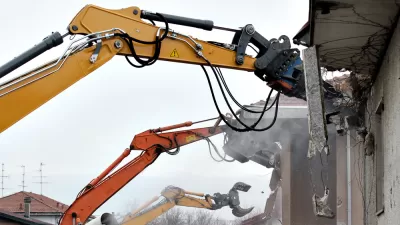One brazen entrepreneur from Detroit is looking to raise funds to bring his "zombie theme park" concept to life, Sarah Cox reports.
Like so many others in Detroit, Marc Siwak is troubled by the state his hometown is in. Residential occupancy has slumped below 40% in vast swaths of the city, and many abandoned houses have decayed beyond repair. Not one to take such indignation lying down, Siwak has launched a plan to make the highest and best use of these blighted spaces: convert them into a sprawling, post-apocalyptic zombie theme park.
Z World Detroit, as Siwak calls it, will offer tourists and locals alike the experience of being "chased down by Zombies, chased through the streets; you'll be running for your life hiding out in buildings, looking for supplies and trying to establish a base."
Cox quips, "Now even visitors from the 'burbs can 'wonder if they will make it through the night.' And new Detroiters that missed 'rock bottom' can pay to have a more terrifying version of the city re-created. (No word on those admission fees yet but someone had better make sure they know to include a Coney Dog stand)."
There's just one catch: Siwak needs $145,000 to move his plans forward. Judging by the strength of the proposal's conceptual mock-ups, though, we might be better off just waiting for an actual zombie apocalypse instead.
FULL STORY: Zombie Apocalypse Theme Park Will Fix Neighborhood Blight

Maui's Vacation Rental Debate Turns Ugly
Verbal attacks, misinformation campaigns and fistfights plague a high-stakes debate to convert thousands of vacation rentals into long-term housing.

Planetizen Federal Action Tracker
A weekly monitor of how Trump’s orders and actions are impacting planners and planning in America.

In Urban Planning, AI Prompting Could be the New Design Thinking
Creativity has long been key to great urban design. What if we see AI as our new creative partner?

King County Supportive Housing Program Offers Hope for Unhoused Residents
The county is taking a ‘Housing First’ approach that prioritizes getting people into housing, then offering wraparound supportive services.

Researchers Use AI to Get Clearer Picture of US Housing
Analysts are using artificial intelligence to supercharge their research by allowing them to comb through data faster. Though these AI tools can be error prone, they save time and housing researchers are optimistic about the future.

Making Shared Micromobility More Inclusive
Cities and shared mobility system operators can do more to include people with disabilities in planning and operations, per a new report.
Urban Design for Planners 1: Software Tools
This six-course series explores essential urban design concepts using open source software and equips planners with the tools they need to participate fully in the urban design process.
Planning for Universal Design
Learn the tools for implementing Universal Design in planning regulations.
planning NEXT
Appalachian Highlands Housing Partners
Mpact (founded as Rail~Volution)
City of Camden Redevelopment Agency
City of Astoria
City of Portland
City of Laramie





























